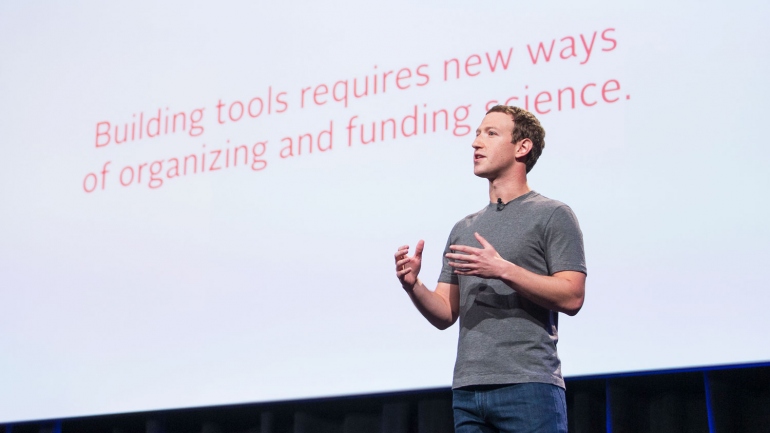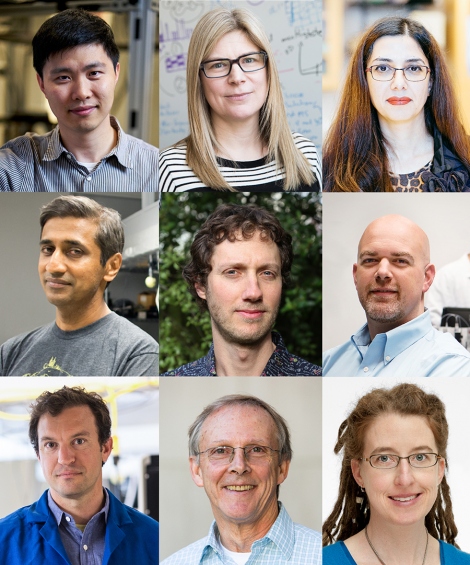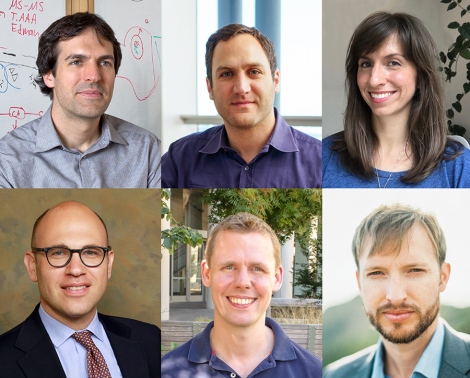15 UCSF Researchers Named to First Cohort of Chan Zuckerberg Biohub Investigators

Fifteen UC San Francisco faculty members have been named to the first cohort of Chan Zuckerberg Biohub Investigators.
The CZ Biohub is an independent nonprofit research organization formed as a collaboration between UCSF, UC Berkeley and Stanford University with the goal of inventing new tools to accelerate transformative advances in the life sciences. CZ Biohub is funded by a $600 million commitment from Facebook CEO and founder Mark Zuckerberg and pediatrician Priscilla Chan, and it is the first philanthropic science investment made by the Chan Zuckerberg Initiative, which is dedicated to advancing human potential and promoting equality.
The first cohort of CZ Biohub Investigators includes 47 faculty members from the three universities. The group includes both highly accomplished senior professors as well as up-and-coming young faculty. UCSF has nine senior investigators and six junior investigators in the cohort.
Each of the investigators will receive a five-year appointment and up to $1.5 million in unrestricted funding to conduct life science research in their respective areas of expertise.
“CZ Biohub Investigators share our vision of a planet without disease,” said Joseph DeRisi, PhD, professor of biochemistry and biophysics at UCSF and co-president of CZ Biohub with Stephen Quake, PhD, of Stanford. “To realize this vision, we are giving some of the world’s most creative and brilliant researchers access to groundbreaking technology and the freedom to pursue high-risk research. CZ Biohub Investigators will challenge traditional thinking in pursuit of radical discoveries that will make even the most stubborn and deadly diseases treatable.”
UCSF’s Senior Investigators

The nine senior investigators from UCSF are:
Adam Abate, PhD
Abate builds new technologies to enable complex biological systems to be understood quantitatively and comprehensively, as illustrated by his development of the picoinjector to inject very small volumes of reagents into droplets at high rates. He is now developing ways of printing organ-like structures by the precise placement of different cell types at defined positions.
Hana El-Samad, PhD
El-Samad analyzes the control of feedback loops, a fundamental underpinning of life, to understand their interconnected architecture and predict their failure modes in disease. She is embarking on a major effort to build de novo synthetic circuits consisting of biomolecules that can implement feedback control on demand.
Zev Gartner, PhD
Gartner aims to define the rules used by cells to self-organize into structurally ordered tissues, and to reveal how tissue structure guides the flow of information between cells to coordinate decisions and behaviors. He is developing a system to quantitatively measure how the local density of mesenchymal cells and their tractions affects the curvature of overlying tissue.
Bryan Greenhouse, MD
Greenhouse addresses fundamental questions about the transmission of malaria to better target and evaluate interventions to control the disease by combining field studies in infected areas with advanced molecular genetic studies in the laboratory. He is using more sensitive parasite detection, parasite genetics to track infections, and antibodies as a record of past exposure.
Bo Huang, PhD
Huang has visualized the dynamics of chromosomal organization by multicolor imaging and has developed super-resolution microscopic methods for mapping proteins in key cellular structures. He plans to develop a fluorescence-microscopy-based approach for the discovery and characterization of cell signaling networks, particularly those involving G-protein coupled receptors.
Tanja Kortemme, PhD
Kortemme is developing a platform technology to computationally engineer novel biological components that convert the sensing of diverse and currently undetectable small molecule signals into cellular responses. She is devising ways of making CRISPR-based gene editing switchable by small molecules.
Hiten Madhani, MD, PhD
Madhani is exploring whether cells maintain epigenetic memory, mediated for example by the methylation of cytosine residues in DNA, over evolutionary timescales. He is characterizing extant DNA methyltransferases, particularly those involved in fungal virulence, to trace their evolution and to engineer cellular memory devices.
Katherine Pollard, PhD
Pollard studies the microbiome of humans, the microorganisms and viruses harbored by us, to determine its role in shaping the health of people and their responses to therapeutic agents. Her laboratory has just released prototype open source software that quantifies microbial population genetic variation using metagenomics data and will scale it for use by hospitals.
James Wells, PhD
Wells is tackling the fundamental question of how cells remodel their surface proteomes, encoded by about 3,000 genes, in response to changes in state, disease and therapeutic intervention. He is developing robust quantitative proteomics methods for profiling cell surfaces and generating recombinant antibodies to membrane proteins on an industrialized scale to address this challenge.
Junior Investigators

The six junior investigators from UCSF are:
Adam Frost, MD, PhD
Frost uses atomic-resolution cryo-electron microscopy in concert with biochemistry, genetics and live imaging to advance our understanding of how cellular machines function normally, how they are corrupted by disease, and how they are hijacked by infectious pathogens. His studies of protein quality control may lead to new targets for the therapy of infectious diseases.
Lisa Gunaydin, PhD
Gunaydin seeks to elucidate the cellular and circuit mechanisms underlying major psychiatric diseases. She will carry out optogenetic studies of a genetic mouse model of obsessive-compulsive disorder to elucidate the patterns of abnormal neural activity as a first step in intervening to restore normal behavior.
Martin Kampmann, PhD
Kampmann’s goal is to understand the molecular mechanisms driving neurodegenerative diseases such as Alzheimer’s and Parkinson’s. He is developing cell-based models of neurodegenerative disease processes in human induced pluripotent stem cells and is carrying out CRISPRi screens to identify underlying neuron-specific processes.
Alex Marson, MD, PhD
Marson is developing genome editing technologies to understand how sequence variation in the human genome alters and controls T cell immune function. He aims to engineer a new generation of targeted therapies for autoimmune disorders, immunodeficiencies, and infectious diseases.
Oren Rosenberg, MD, PhD
Rosenberg uses structural biology and microbial genetics to discover and exploit molecular vulnerabilities in bacteria for the development of next-generation therapeutics. He focuses on bacterial virulence systems that mediate interactions with the mammalian host in his search for new targets.
Kole Roybal, PhD
Roybal explores how T cells orchestrate a vast signaling network during their activation in the immune response. He will focus on the dynamics of synthetic notch receptors and other signaling domains to devise new ways of controlling immune function in cancer therapy.
Scope of CZ Biohub’s Work
In addition to the investigators program, the CZ Biohub is undertaking two potentially transformative research projects: the Cell Atlas and the Infectious Disease Initiative.
The Cell Atlas will be a map made available to researchers around the world that reveals the many different types of cells that control the body’s major organs, such as the brain, heart and lungs. Several CZ Biohub Investigators are conducting research aimed at developing additional technologies to further accelerate the creation of the Cell Atlas.
The Infectious Disease Initiative will explore new ways to create drugs, diagnostic tests and vaccines against the many infectious diseases that still threaten much of the world, such as HIV, Ebola and Zika. The CZ Biohub’s work will be clustered around four key areas: new detection technologies, new treatments, new ways to prevent infection, and new approaches to rapid response when new threats emerge.